 This past week I had the joy and challenge of a vacation in the mountains of Colorado. It was a joy because of the grandeur of the mountains and the abundant life around me. It was a challenge because I have lived most of my life at sea level and so it was difficult to acclimate to an altitude of over 9,000 feet. Yes, the air is fresh, but it lacks the amount of oxygen I am used to breathing. I want to say I fully acclimated, but puffing though climbing a few flights of stairs all week provided proof I had not. However, I did hike near the top of the mountain which was between 11,000 and 12,300 feet. The trick was in slowing down rather than in trying to go my usual fast pace. The beauty of slowing down was that I was forced to notice a lot more than I would have had I been able to rush to the destination. There was much beauty to behold, so slowing down helped me to truly savor it. I guess there is much to be said for less oxygen. It actually provided more clarity. One of the hikes took my husband and I up a gravel roadway past patches of forest punctuated by clearings which are ski runs during the winter. After a delightful stay at the top of the trail, we began our descent. On the way down I noticed trees which had fallen in the midst of the healthy forestation and chuckled as I thought of the old Zen koan:* "If a tree falls in the forest and nobody is there to hear it, does it make a sound?" I smiled at that for a moment or two and then began to really think about it. While one could playfully argue both sides of the conundrum, debating it would be missing the point. The issue should focus not on the sound the tree might make in falling, but that God is aware that it fell, regardless of whether any human was there to witness the event. In other words, nothing escapes God's notice. He is aware of every tree that falls, every creature who cries out to Him in praise or in desperation. 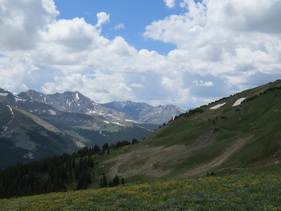 When we hiked on the mountain it was as if we were totally alone, but the beauty of our surroundings gave witness to our Creator. The mountains sang of His presence, not just in memory of His creating them, but in their present beauty. There was a lesson even in witnessing a dead tree. The decomposition of trees is life-giving for all sorts of creatures, seen and unseen. Life is present all around, even in the things that seem dead. Life that did not at first glance seem like life at all was actually abundant and verdant. This is the Gospel message: we never lose hope because out of death comes new life. Jesus came into the world to give life so that we could live it to the full, (paraphrase of John 10:10.) He healed people everywhere He went. He brought new life to the diseased, the possessed, the injured, and the dying. He even gave life to a dead man. He brought new life through His preaching and teaching. He brought it in loving all sorts of people that no one else would even go near. No one was beyond His love and His efforts to share the Good News. The culmination of this was in giving us His body and blood which give life in a way that is beyond our comprehension. In death there was, and is, incredible life. The One who conquered death gives new life continually. That is the beauty of our God. He never stops giving us new life. When we need it most, He takes that which seems dead (or nearly dead) and restores it. He does not merely resuscitate us, breathing a bit of air into our oxygen-deprived ‘spiritual lungs’ to give us a jump start. Rather, he gives us better life, and life which will someday be eternal. If we are truly attentive to the gift He offers we realize that the new life is deeper and fuller than what we had before.  The deepest mystery, then, is the new life that comes through suffering. This is the most difficult to see because it can be the most deeply hidden. But in suffering there is much to learn and much to discover in ourselves and in God. We can learn that we are never alone and we can discover strengths within ourselves that we never knew we had. We can learn that Jesus is indeed with us, since He knows intimately what suffering is about, having suffered so terribly during His own life on earth. We can learn the depths of prayer as we cry out for help in our pain. And we can learn to co-exist with mystery, since suffering is beyond understanding much of the time.  We can also learn to be compassionate with the suffering of those around us. Just as in the forest it is easy to miss the potential for new life when we think something is dead, it is easy to mistakenly think some people are beyond healing. Or we see that the suffering is so deep that we feel overwhelmed, unable to know how we could possibly alleviate something so big and beyond us. But it is through the gift of compassion that we can make a difference. Many people who suffer do not have anyone to show them that suffering is not an exile. That is, they do not know that Love is present unless someone personifies it for them. How do we expect those suffering to really know God hears their cries if we do not attend to them? If we do not bring caring love how would they know that God hears their pleas, just as He hears that tree falling in the forest? God wants the suffering to know He is near, but most of the time He needs us to be the agents of His care, the bearers of His message. Oh yes, God could swoop down and heal everyone with one proverbial snap of His fingers. We would learn nothing and expect everything to be handed to us all the time if this was the case, and the result would be that we would appreciate nothing. If our world was not broken we would not need healing. If the world did not need healing God would not have sent His Son. It is and He did, that is the reality. But the story does not end there. When Jesus rose to Heaven, He left a very powerful force to continue His work: He left us, Spirit-filled, as His disciples so that we could continue to bring the healing that is needed in our world. He has outfitted us, so to speak, with all the gear we need to bring healing into the world. He has given us graces, incredible powers, including faith, hope, and love, which overflow into the world every time we live the message of His Gospel. He has given us numerous gifts so that we might take the message to the lonely and the broken that do not necessarily have to be in far-off places. Many times they are in our own cities, neighborhoods, and our own families. And of course, we, too, are broken.  That is the wonder of it all: we are broken, but we can be instruments of healing. And in going forth with love and care for others we also heal ourselves. Therefore, let us realize that God does know our every movement and is with us every moment of the day; we do not go alone. Let us remember that He does hear every silent plea and every cry of help that goes out to Him, but that often He needs us to help Him answer those prayers by being His instruments of love. Some people do not listen to Him, or they do not know how, and some people are very different than we would choose to be and so we find reaching out to them difficult, but that does not mean we are to stop loving them. Rather we are to imitate the Lord and listen carefully in order to hear the way He hears. Let us be attentive to the tree that falls, so to speak, so that we may be there to be instruments of new life, bringing love through our actions and through the unseen gift of prayer for those who do not even know we are praying for them. That is the way of Love. It often comes in silence and mystery. So yes, the tree that falls in the forest is heard because it is never really alone. May we trust that the Father is aware of us at every moment of the day! May we call upon Jesus to help us when we are in need and when we need Him to help us help others! May we be empowered by the Holy Spirit to use the gifts given to us knowing that we can ask for the specific graces we need! May we have gratitude for the beauty of the earth! And may we have the courage to be instruments of love and healing! Let us continue to meet in the heart of Jesus! Peace! ©Michele L. Catanese *Koan: “a paradox to be meditated upon that is used to train Zen Buddhist monks to abandon ultimate dependence on reason and to force them into gaining sudden intuitive enlightenment.” Definition found at http://www.merriam-webster.com/dictionary/koan All the photos are mine. They were taken on Copper Mountain in Colorado. They were shot on various trails at upwards of 11,000 feet elevation except the one of the sky at dusk. That was taken at approximately 9,300 feet in the village at Copper Mountain. 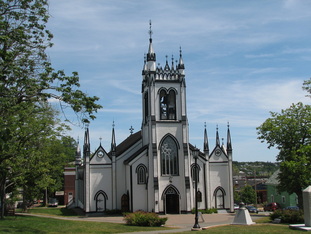 Not long ago I had the experience of attending a memorial service at a church of a denomination which is different than my own. It was probably clear to the people gathered that my husband and I were not members of the congregation partly because they all seemed to be very close to one another and we did not know anyone except a close family member of the deceased one. However, it took but a moment to feel right at home because we could hardly take a step without someone coming over and welcoming us with a smile and an outstretched hand to shake. My parish is a very warm place, but these folks were outstanding in their welcome to us. Men and women approached us and introduced themselves and made sure we felt like we were at home in their church. Rarely have I ever felt like I belonged as much as I did that day. Being welcomed is one of the most pleasant experiences one can have. If we are traveling to a foreign country and the language is not ours, yet people come over to render assistance when we give puzzled looks, there is less a sense of being a tourist and more the sense of being at home. It is gratifying to walk into a new place and have someone come over and say hello. And it certainly takes away any nervousness one might have if making small talk is just 'not your thing.' But being welcomed is also part of what it means to be a Christian. We should make everyone whom we meet feel either like a long-lost friend, or a friend whom we have not yet met. Truth be told, we are all sojourners in a strange land. This earth is our home, but it is only a temporary one. Our life is a journey from start to finish. But we do settle somewhere, even if for a short time, and that place becomes home. Whether we identify 'home' with where we were born and raised, a city or town in which we lived the longest, or simply where our 'hat is hung' today, feeling at home is very important to us. It is also very important to God. God wants us to be at home in our towns and in our gatherings. He wants us to feel at home in our own skin and mostly He wants us to feel at home with Him. The Scriptures make that point very clear as we see numerous examples of God teaching the value of being welcoming to His people. In the beginning God did everything He could to help Adam and Eve feel at home in the Garden of Eden. It was all for them. Even after they sinned and were expelled from the Garden, God made sure that their sense of exile was not total. Yes, they lost their immortality, but God gave them a beautiful land to subdue, to plant, to harvest, and in which to reside. He made their return to Paradise something not impossible, though something for which they would have to wait in trust; it would be many hundreds of years before the Son of God would come into the world to open Paradise once again, but the promise was there. In the meantime they were to be at home in the land He provided. And to make sure that they did not forget that the welcome was meant for all His people, He wrote it into the Law that they were to welcome the widow, the orphan, the poor, and the 'stranger in our land.'  Throughout the Old Testament the directive to welcome and accept others appears many times. When the people would forget to be welcoming, God would send a prophet to write or speak His word reminding them. (Two good examples are the Book of Ruth and the Book of Jonah.) The idea was that they were to open their hearts to the stranger in order to let their faith be appealing to them and so to welcome them not just into their land, but into the community of believers, that they may come to know God. Therefore their welcome was as ambassadors of God; their welcome was His welcome. In other words, the people were to teach about God's love through their example. The best way God could reach out to those who were pagan was to have His people treat them with love. The problem was that quite often instead of inviting the pagans to be like them, they often became like the pagans. But when this happened and His people fell into exile, they would recognize that they had lost their own welcome by turning their backs on God. They would then repent, thus experiencing the most important sign that we are so welcomed by Love we can never lose it: they received God's forgiveness and pardon. 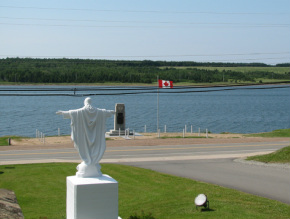 The New Testament is the story of welcome 'par excellence.' God fulfilled His promises by sending His Son into the world to teach us His ways anew and most importantly, to open Heaven to us again so we could spend eternity with God in Paradise. During his ministry Jesus taught us how to be loving, especially through the practice of forgiveness. He spent time with the social outcasts of the day, both to teach us by example and because of the real compassion He had for them. He was criticized for spending time with prostitutes, tax gathers, the sick, the poor, women, foreigners and all those who were deemed less valuable members of society. He even attempted to be welcoming to His enemies, though they continued to reject Him. He wanted them to know the welcome was extended not just to the Jewish people, but to all people. He taught His followers to love equally and not with partiality. All this because He wanted to underscore the message: ‘all are welcome in my Kingdom.’ It is important for us to reflect a bit on state of our sense of welcome. Do we feel welcomed by God? If not, is it because we have not spent much time allowing Him to do so? Or are we avoiding Him because we are letting some area of sin keep us from accepting His love and forgiveness? Maybe we have been hurt by others so we think that God would only be a disappointment if we were to turn to Him. Actually it is through prayer that we can discover the depth of God's love. We can let Him help us to find a community of friends who are welcoming, God being the first among these. Conversely, are we welcoming? Are we the ones who occupy the pews but resent when someone sits near us and tries to say hello? Are we welcoming when new people move into our neighborhoods or try to join our ministries, offering something new and different? I will never forget the time I was away from daily Mass for a few weeks; when I returned one of the ushers approached me to say he had missed seeing me! Given that it was not my own parish, I was amazed. But I felt so welcomed that it was a great gift to know someone had noticed my absence. Do we let others know we noticed their absence, or their presence, or that something about them has changed in any way? 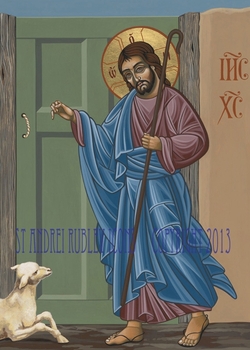 God wants us to be His ambassadors of welcome today, just as He did from the very beginning of our creation. If one reads the Gospels even with a cursory glance, one will see that the difference Jesus made in the lives of those whom He touched was that He noticed things about them. That He noticed an outcast at all was a wonder to them. But that He went beyond simply acknowledging their presence to establishing a relationship was stunning. He did not just throw them crumbs like a rock star passing through a throng of fans: Jesus made real contact in order to establish real relationships with real people. And He continues to desire that for and with us today. Jesus wants to make contact with each one of us. He wants us to know of His love and forgiveness. Most of all He wants us to feel at home with Him such that as He has opened His heart and home in Heaven to us, we know the invitation is eternal. May we ask for the gift of hospitality! May we be sensitive to those who feel unwelcome! May we imitate the holy ones and saints in being welcoming to all whom we meet! May we ask Jesus for the gift of open hearts, warmth, and sincerity so that we might help others feel at home in our presence! May we accept the gift of hospitality which is offered to us by Jesus, especially when He comes in a "distressing disguise' such as in the person of the poor or outcast! And may we accept His gift of welcome home in Him during our lives! Let us continue to meet in the Heart of Jesus, our home! Peace! ©Michele L. Catanese The two photos are mine and were taken in Nova Scotia, Canada. The painting is Ruth Declares Her Loyalty to Naomi by Pieter Lastman, (1583-1633). The icon at the end of the post is El Buen Pastor by Fr. William Hart McNichols and can be found at http://www.fatherbill.org/all-categories/product/37-el-buen-pastor  Recently I learned a lesson firsthand about the consequences of not paying complete attention to what I was doing. In our culture, not only is the habit of "multitasking" common, but it is actually encouraged. All of us can relate to being out on the road and observing someone in a car who is texting and talking to another simultaneously while trying to drive. We know it causes accidents, some of which are quite devastating. Even when we are not in our cars, we have seen people walking down the street with their eyes attached to their phones, not watching where they are walking or with whom (or what) they are about to collide. I admit to having done the latter, never the former. It is just part of the way we are enculturated to do things. Since we have access to so much information and to each other so readily we can be easily tempted to try to be connected at all times, even when it is really not prudent. My own experience did not involve a car or a mobile device. In my case I was trying to walk briskly on my home treadmill while watching a recent World Cup match. It was not the TV which caused the distraction. The danger began when I realized my new walking shoes had overly long laces. I was thinking that I really ought to do something about them after I finished my walk. Then I began to try to put on the headphones so I could hear the game and not just watch without the sound. As I reached for the headphones, which were on the handlebar just to my right, I stopped being attentive to what I was doing and to the overly long shoelaces, and proceeded to step on one, left foot on right lace. Down I went. I did not break anything, but there are significant bruises, both physically and to my pride. I was very lucky not to have gotten hurt any worse than I did. I never thought it would happen to me, but it is oh, so easy to do.  Upon reflection, (three x-rays and a lot of bandages later), I realized that anytime we divide our attention we are asking for trouble, especially if it has to do with something visual. I know some people can pull this off, but it is dangerous. We simply cannot be fully attentive to multiple things at the same time. We can be somewhat attentive, but not fully attentive. And if whatever it is we are doing simultaneously involves vision, such as walking and reading a text, we are bound to eventually collide. If we are not fully attentive to where we are and where we are going, we render ourselves virtually blind. We can try to fool ourselves into thinking that we are able to handle it, but there are many situations in which we are literally blind to what is really happening around us. The consequences of this can be painful.  This is true in everything we do. Imagine eating pasta with a delicious sauce and simultaneously gulping on a soft drink. We neither taste the pasta nor the drink because we have attended to neither. Instead we have something less than the intended tastes. But if we are fully attentive to each, we can savor the tastes as they were intended to be. In our relationships, and especially in our relationship with God, we also can be less than fully attentive. Quite often we sit down for prayer and we are not fully present to God. It is as if we want to put in our time, well-intentioned as we may be, but we are only having a rambling monologue and not a dialogue. Then we wonder why God seems so silent! We have to take the time to learn His language, so to speak. God designs His messages and His way of communicating to each one uniquely. He goes out of His way to tailor His relationship with us to our needs, our way to perceiving, and what is most meaningful to each one of us individually. But if we do not give ourselves a chance to listen, we will never discover that. We can render ourselves blind all while in the pursuit of a spiritual life. The result of this practice is that we will give up under the mistaken idea that God is not paying attention, rather than seeing that we are the ones who are not fully attentive. The only way to be truly attentive to God is to put in the time and effort with an undivided mind and heart. The desert fathers and mothers used a term called 'aplotes' in their writing. It means 'single-mindedness.' It refers to the notion that we need to be focused on our relationship with God with an undivided heart and mind. In this case we can apply the term to our need to be attentive to the One whom we seek. It means we need to try to put nothing before our relationship with the Lord so that God comes first in our lives. We talk about ‘the practice’ of prayer: it is something we become more comfortable with by spending the time becoming proficient. The good news is that God does more than meet us halfway. All we have to do is show up and pay attention. God is infinitely interested in what we have to say and in our needs. He realizes we are broken and easily distracted, but we have to make the effort to be where we are, trying to keep our attention on Him or we will find ourselves giving up on our prayer. The best way to do this is to take our distraction to God; the mistake most of us make is to try to run from the distractions. Our distractions actually reveal that which concerns us. They have an importance to our prayer, yet we are usually embarrassed to admit we find it hard to concentrate because of them. If we put our distractions to use, we will find that not only do they reveal our cares to us, but we can learn to turn them over to God so that they are in His hands and are not holding us captive. ("Cast all your worries upon Him because He cares for you." 1 Peter 5:7) Once we place them in God's hands, trusting that He will take care of our cares, we can attend to our conversation with God. 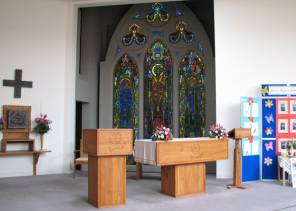 Prayer opens the door to being attentive to God's presence around us. Another mistake people often make is to think that only when we are on our knees or in church will we experience the presence of God or 'hear' His messages to us. Our private prayer time opens our minds and hearts so that we learn how to recognize God in every moment of our lives: it is through our time of prayer that we open ourselves to seeing and sensing God all around us the rest of the day. The 'aha' moments can then take place. This is what I mean when I say we learn how to become attentive. If we open our hearts during prayer, we can be more fully attentive to the movements of the Spirit and the presence of God throughout the day. We literally learn how to become more fully attentive more of the time, rendering ourselves sighted and thus losing the blinders.  It is also important to get into the practice of praying throughout the day, just as St. Paul wrote in 1 Thess. 5:17: "Pray without ceasing." We can make silent prayer a habit by making it an attitude. All we need is to thank God for something that He has given, praise Him for beauty we have seen, tell Him we love Him, ask for a favor in the moment at hand, or say a short prayer such as "Lord Jesus Christ have mercy on me" or "Jesus, I trust in you." Our prayer throughout the day does not have to be elaborate, rather it needs to simply be enough for our attention to be on God so as to see Him, or to see with His eyes, for just a moment. It is amazing what we will begin to notice when we do this. Mostly we will begin to see with more clarity that which is around us. And we will see that God never stops being attentive to us. His presence is eternal. Let us become fully focused on what we are doing especially when we are at prayer. May we ask to see with the eyes of Jesus so that we can see ourselves and others as they are, loved and loveable! May we be attentive to the presence of God in those with whom we come in contact, especially those who are most in need! May we allow our focus to be on Jesus so that we can be aware of His love for us by seeing and hearing the many ways He communicates this to us every day! And may we continually turn to the Lord in freedom and love, knowing that He is present with us always, even in our distractions! Let us continue to meet in the heart of Jesus! Peace! ©Michele L Catanese All of the photos are my own. The top photo is of the Oregon coast. The second photo is of Crater Lake, also in Oregon. The mirror images of the mountain on the water are captivating. The third photo is from part of a delicious meal we had in Sicily last September. (It was course 2 of 5!) The fourth and fifth photos are from Cong, Ireland. 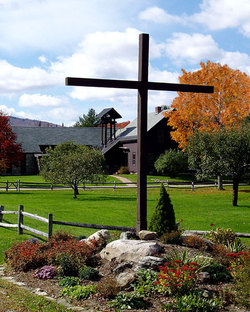 Among my favorite memories are the trips my mother and I used to take to Weston, Vermont. We went numerous times over the span of at least a dozen years in order to visit the Weston Priory, the home of some Benedictine monks. There were many reasons why we loved to go on our ‘famous road trips’ to Vermont, but the main reason was that we loved to pray with the brothers who invite people to come pray the Liturgy of the Hours with them at various times of the day; the grounds are lovely and the monks are known for the beauty of the music they write, setting the chants to original melodies. We would arise at 4:30 AM, quickly get dressed, jump in the car, and drive in the pre-dawn darkness in order to get to the Franklin Room where the monks would gather at 5:30 AM to begin the day with prayer. We would sit on cushions on the floor in the semi-darkness, candles illuminating the room softly, praying with the brothers as the sun rose over the Green Mountains, observable through the large bay window at one end of the room. It was very peaceful and serene. The Benedictines are known for their wonderful sense of hospitality. Somewhere just inside the door, or on the very lintel of the doorway, of every Benedictine guest house or monastery is a sign that says, "When a guest enters, Christ enters." Hospitality is a central characteristic of the Benedictine order. If one is a guest for many days or is simply visiting for a few hours, one is treated with the utmost of kindness, cheerfulness, and graciousness. Therefore when we would go to the Weston Priory simply to visit for an afternoon or to pray one of the Hours, we were always greeted with warmth. Sometimes it was just a smile or a gesture, other times it would be a brother coming over to say a word or two, but we always had a sense that we belonged in their home. The Benedictines were founded by St. Benedict of Nursia (480-543) whose feast is celebrated on July 11. Ironically, the last thing he wanted to do when he began pursuing growth in the spiritual life was to found a community. He began his journey of growth in sanctity and prayer as a solitary, dwelling in a cave. It seems almost funny to think that this man, for whom hospitality became one of the most important characteristics of his order's Rule, did not want anything to do with living in community at first. He withdrew from the world when he was about 19 years old, dwelling in a cave on Mt. Subiaco so that he could pray alone, such as the desert fathers and mothers had done before him in the Middle East. He became known for wisdom and holiness and eventually he was approached by some like-minded men to be their leader (abbot) in a community. He refused many times, desiring solitude. Finally the men convinced Benedict to go with them. But they found his Rule more disciplined than they liked so they tried to poison him as a way to get rid of him. It seems that the Holy Spirit helped him to know something was amiss when they gave him his jug of wine. He blessed the jug and it fell to the floor, shattering, thus saving him from drinking the poison in it.  Benedict returned to the mountain cave at Subiaco, only to have difficulty with another monk who lived nearby. He left Subiaco and eventually settled at Monte Cassino where he founded a community which effectively began the western monastic movement. It is said that in the surrounding area St. Benedict also founded twelve communities each with twelve men, but the monastery at Monte Cassino became his home and was where he wrote his Rule for Monks. The Rule was designed to give a sense of stability and order to the lives of the monks. He placed much value on balance and had not much toleration for overly rigorous fasts or ascetic practices. The daily life of a monk consisted of an equal amount of time in prayer, (communally and privately), for work, and for rest. Every day’s work was punctuated by times of prayer, but the routine was to enable the monk to find God in each of his brothers and in the work he was doing as well as in the choir stall. Work was considered as much a way of praying as was time on one's knees. The Rule is very practical and filled with the wisdom of St. Benedict who had learned much in his own path to sanctity. It is about moderation, simplicity, obedience, and humility, as well as prayer, work, study, and community life. All the monks refer to each other as 'brother,' though there are priests among them, and the abbot is the leader to whom they owe their obedience. The abbot is to guide them with wisdom, being a model of the Rule. An abbot generally leads for life after he is elected by the monks. St. Benedict guided his monks in how to pray, advocating the use of Scripture prayed in small passages at a time, so that the monks could truly digest God's word. The goal of such prayer was always God, not special gifts or phenomenon. The life of a monk was (and still is) meant to be a means to prayer for the outside world, not an escape from it. Though they do take a vow of stability, which means they will stay in their community for life, they are very much attuned to the world outside the walls of the enclosure. Their prayer is not simply for their own private road to Heaven, but it is a way of praying for the needs of the world beyond their walls. One could say that their hospitality is not just for one entering their homes, but it is hospitality of heart which they strive for. 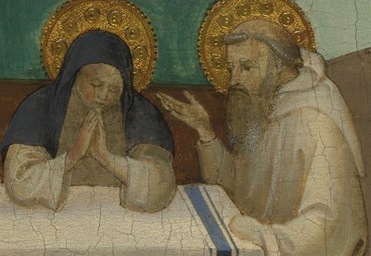 While the rule is truly a work of wisdom, even St. Benedict had to struggle with it. It is said that he and his twin sister, Scholastica, (a saint in her own right), had one visit every year. She had become the abbess of a community of women living the Benedictine Rule and had also founded many other monasteries for women. On one occasion while he was visiting her monastery, they had long discussions that went on into the evening. As night began to fall, he told her he had to leave because he could not spend the night outside his monastery. She begged him to stay, but he refused to bend the rules for his own sister. So she prayed to God to intervene and a storm blew up that was so severe, he was unable to leave and had to stay the night. Benedict left the next morning, but three days later she died. It had been their last visit. Often 'the rules' can be difficult to keep. But there are times when we have to let common sense prevail. Benedict was a great saint, but he did not cease to be human. Therefore we can learn a lot from him. We learn that the path to holiness is arduous: we have to work at it, and we will have our ups and downs on the journey. We learn that balance and moderation are very important. We learn that all of life is spiritual: it is not something we compartmentalize. Though the monks had an order to their day, the idea was to allow work to become as prayer and prayer as part of one's work. That is, there should be a seamless flow to all we do so that prayer is a part of everything. This means that we allow ourselves to see Christ in each person with whom we come in contact. The love and generosity with which we welcome the other flows from our prayer and is an act of prayer. It becomes a way of seeing Christ all around us, including within ourselves. All becomes sacred and this realization leads us to gratitude. St. Benedict's way is one of many different spiritual paths to God; many people are attracted to it, even lay people. The Rule of St. Benedict is a best seller in the realm of spiritual books and can be found quite easily. At the heart of it is that no matter what we do, all must be directed toward God, not just to be of service to Him, but in order to know Him and His love for us. For Benedict it was important to become like the One he loved so as to help build the Kingdom through prayer and service. It was not an escape from the world, but rather an immersion in the world through prayer and reflection. To dedicate one’s life to prayer and glorifying God is, in fact, the spiritual journey of a disciple of Christ. Therefore we can let St. Benedict teach us how to be more aware of Christ’s presence through prayer and the discipline of learning to recognize Him in one another, welcoming Him with great hospitality. May we ask for the intercession of St. Benedict that we may learn to see each person as the presence of Christ! May we ask for the gifts of generosity and hospitality so that we may be welcoming to all! May we imitate the Benedictine way by learning to grow in prayer and service! May we seek to have balance and moderation in all we do! And may we open our heart as a home in which Christ may be most welcomed, just as he welcomes us into His heart! Let us continue to meet in our home, the Heart of Jesus! Peace! "Let all guests who arrive be received as Christ..." "...let all kindness be shown them." -Rule of Saint Benedict ©Michele L. Catanese For more on St. Benedict you can go to http://www.osb.org/gen/benedict.html and for more on St. Scholastica you can go to http://www.catholic.org/saints/saint.php?saint_id=240 The photo is of Weston Priory and appears on their webpage, www.westonpriory.org The image of St. Benedict is by Fra Angelico and is in the public domain. The second painting is of St. Scholastica at prayer with St. Benedict and is part of an altarpiece by Lorenzo Monaco and is found in the National Gallery of London. |
Heart Speaks to Heart
|

 RSS Feed
RSS Feed

